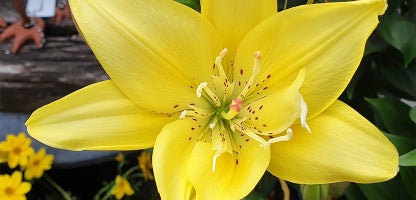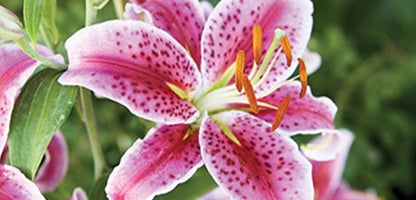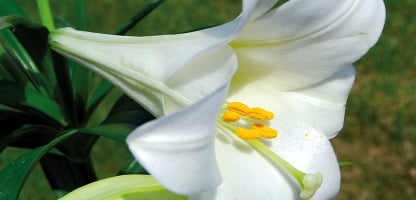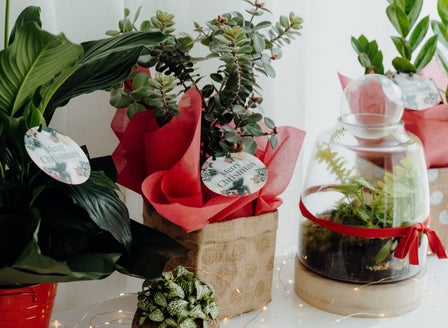Lilies are a hardy easy-to-grow bulb, with large often fragrant, trumpet shaped blooms in a multitude of colours. Great in flower gardens, or grown in containers they are fantastic for picking and are long lasting in a vase.
Planting Calendar
Lilies are grown from bulbs, winter is the perfect time for planting, bulbs are available in store from July ready to plant for magnificent summer display.
Prepare
Position
Lilies like a position that gets at least 6 hours of direct light a day but can cope with part shade. A sheltered area is recommended as lilies can grow up to 180cm so staking may be required. They grow well when planted directly in the garden or in pots, there are even patio or dwarf varieties bred especially for containers.
Soil
Lilies require a free draining soil rich in organic matter. If the soil is heavy, consider planting in mounds or containers to prevent the bulbs from rotting in wet conditions. When planting into a container plant into Kings Potting Mix.
Plant
In the Ground: Fork up the ground and add Kings Compost. Plant the bulb with the flat end down and the pointed end up, 10 cm deep and 15 – 20 cm apart. If planted too deep they won’t sprout and will eventually die. Water deeply after planting. In Containers: Choose a container that is at least 30 cm wide and deep and use Kings Potting or a Bulb mix. Lilies in containers will need to be fed and watered regularly to ensure healthy growth and beautiful blooms. The potting mix will need to be replaced every two years to refresh the soil. This is also a good opportunity to divide any new bulbs.
Care
Watering
Lilies growing in the ground may not need watering at all, but check during prolonged dry periods in summer. Those in containers will need regular watering to keep the soil just damp in spring and summer.
Feeding
Lilies are not heavy feeders and ordinarily reabsorb all their energy back into the bulb at the end of the season. The best times to feed the bulbs with good quality bulb food are once the young sprouts emerge, as the blooms are about to open and once the plant has started to die back. If the flowers have been cut, the last feed of the season will be appreciated all the more.
Mulching
If planted in the ground, mulching will help to keep the soil moist in hot dry weather, keep the roots cool and help suppress weeds.
Pruning
As the blossoms fade, snip them off to keep the plants looking tidy. You can eventually remove the entire cluster of spent flowers, but leave behind as much stem as possible. Allow the stem and the leaves to continue growing until they turn yellow in late summer or fall. At this point, cut the stems back to within a couple inches of the soils surface.
General Care
When using sprays, chemicals or fertilisers always read the label and follow the instructions. Apply sprays in the evening to avoid harming beneficial insects.
Beginner Tip
Planting in groups of 3 – 6 will provide you with a stunning display of beautiful flowers. By planting a variety of different types of lilies, you can enjoy a succession of beautiful flowers in bloom throughout summer..
Expert Tip
Lily bulbs will multiply and come back to bloom again each summer. If you want your lilies to do this, it’s important to not to cut the stem at the base until it has gone brown/yellow. Lilies absorb nutrients from the stems and leaves back into the bulb ready for the next flowering cycle. Lift and divide you bulbs every 4 years.
Tip
Cut lily flowers will last 7–14 days in the vase. When cutting lilies make sure you leave at least a third of the flower stem so there is enough plant material for the bulb to reabsorb nutrients at the end of the season. Select flowers that haven’t yet opened. Remove the pollen-covered stamen tips when the flowers are fully open, as these can stain fabric and are toxic to cats. Keep them out of direct sunlight to make cut blooms last longer.
Top Varieties

Asiatic Lilies
These beautiful lilies grow up to 1 metre tall and produce incredible flowers up to 10cm wide, they are well suited for growing in containers. They have no fragrance but are highly popular due to their wide range of incredible colours. Blooming from November to December they are perfect for people who are sensitive to fragrances or find other lilies with fragrance too overpowering. Asiatic lilies are easy care and quick to sprout and will flower around 75 days after planting.

Oriental Lilies
This lily type has the strongest fragrance out of all the lilies, having strong stems, they are a great choice as a cut flower. They do take a long time to flower, approximately 100 days from planting to flowering.

Trumpet Lilies
Trumpet Lilies have a flower with an elongated trumpet shape. These distinctive blooms can grow as long as 15cm long and 10cm wide. The Trumpet Lily family also includes Christmas Lilies, which are much-loved for their gorgeous fragrance. They flower throughout December and the plants themselves can reach an impressive 1.5 metres tall!
Frequently Asked Questions
When is the best time to plant lilies?
Plant lilies in early spring or late autumn. Mild climate allows for flexible planting times, but these periods are ideal for bulb establishment.
How often should I water my lilies?
Lilies growing in the ground may not need watering at all, but check during prolonged dry periods in summer. Those in containers will need regular watering to keep the soil just damp in spring and summer.
Do lilies need fertiliser?
Lilies are not heavy feeders and ordinarily reabsorb all their energy back into the bulb at the end of the season. The best times to feed the bulbs with good quality bulb food are once the young sprouts emerge, as the blooms are about to open and once the plant has started to die back. If the flowers have been cut, the last feed of the season will be appreciated all the more.
How do I care for lilies after they bloom?
After blooming, remove spent flowers to prevent seed formation. Allow the foliage to die back naturally, as it helps nourish the bulb for next year's growth. Cut back the stems once they turn yellow.
Are lilies toxic to pets?
Lilies are highly toxic to cats and can cause severe illness or death if ingested. If you have cats, consider planting lilies in areas inaccessible to them or choosing non-toxic plants instead.
